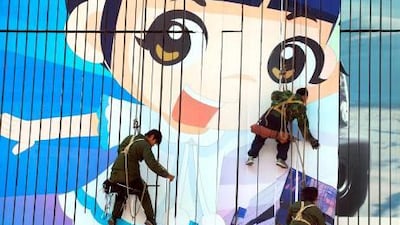It is still possible to find advertisements in China that seem to belong to a different era.
You might see them in provincial railway stations or other modest locations hundreds of kilometres from China's "first-tier" cities.
Instead of showing a shiny new product and a top celebrity, these billboard throwbacks to a more innocent age might try to lure customers with a photo of a factory. Or perhaps they will list in excruciating detail which international accreditations a manufacturer has secured.
But while some ads in China seem out of step with the modern world, others reflect perfectly the country's rush into the digital revolution.
Whether it is competitions on social-networking sites or virtual communities that mirror a brand's activities, China has a cutting-edge advertising scene aimed at its 400 million internet users.
"You still see a lot of low-quality advertising put out [even] on a national level," says Ben Cavender, an associate principal with China Market Research Group. "But the leading Chinese companies, their advertising is pretty sophisticated."
As with so much in China, advertising has come a long way in a short time. In three decades it has developed from a sector condemned as "capitalist" and "bourgeois" to a US$74 billion (Dh271.8bn) industry served by about 100,000 agencies, according to CTR Market Research.
Television attracts a vast slice of the revenues - about 114.7bn yuan (Dh63.4bn) - with the state network China Central Television (CCTV) still able to generate a bidding frenzy among companies keen to screen their ads in prime time. Late last year, the auctions for this year's key viewing periods generated 10.97bn yuan.
That was up 18.5 per cent on the previous year, impressive given many multinationals were cutting advertising budgets by between 10 and 15 per cent in the global slowdown.
"There is this logic that if a product advertises on CCTV it has to be good, otherwise the government would not allow you to advertise," says Dr Junsong Chen, a lecturer in marketing at Shanghai's China Europe International Business School.
Although they continue to generate vast revenues, ads on CCTV are no longer the guarantee of a brand's success, Dr Chen says. Part of the reason for this may be the new platforms for advertising.
That is not to say traditional advertising outlets are finished. Newspapers and magazines attracted 91bn yuan in advertising revenue last year, while radio revenues grew nearly 5 per cent to 7.6bn yuan.
But the new media frontiers are generating most of a stir.
"Outdoor advertising - you see a lot of LCD screens with different advertising - is becoming particularly important," says Dr Chen.
Online advertising is also attracting much of the attention. Last year, online revenues were estimated at 20.9bn yuan, and some studies have indicated it has grown this year by as much as 53 per cent.
Mr Cavender says spending on online advertising is only between 4 and 5 per cent of the total advertising amount but it is starting to approach that in some of the world's most developed markets.
"The people aged between 18 and 35 are driving retail spending in China and they get the vast majority of their information from the internet," he says.
Such consumers watch little TV, instead getting their news and watching videos online.
"There's been a big shift, and companies are catching up and providing digital content for their advertising," Mr Cavender says.
People such as Dr Matt McDougall, the chief executive and founder of the online advertising company SinoTech in Beijing, are capitalising on this trend.
Several years ago online advertising was mainly about buying banner ads on popular sites, Dr McDougall says. Today it is much more about engaging consumers to build brand loyalty.
The sector is becoming more "performance driven", with the amount paid often closely related to the number of clicks an ad receives, Dr McDougall says.
One celebrated example of the new frontier of digital advertising in China was when Pepsi ask consumers to submit screenplays for a TV ad to be made by the pop singer Jay Chou. There were 28,000 scripts submitted, 690,000 internet postings made and 5 million votes from netizens to choose the best script.
But for all the recent developments, some believe China's advertising industry has yet to reach its potential.
Tom Doctoroff, the north Asia director of the world's fourth-largest advertising agency JWT, has expressed concerns in a previously published report that there are too many agencies that are undercutting one another, harming quality.
And many of the large state-owned enterprises, while becoming more commercially savvy, still did not understand how to develop brands, although he said they were gradually adapting to the modern age.
But Mr Doctoroff said an increasingly liberal regulatory framework was allowing more foreign agencies to set up independently in China without joint-venture constraints.
Whatever hurdles remain, many are optimistic about, in particular, digital online advertising.
Dr McDougall says many companies in China are putting 15 per cent of advertising budgets into digital, and he believes this will increase.
"It wouldn't surprise me if by 2015 we see 30 per cent of spend on digital," he says. "In five or six years, it's gone from a very small percentage to a significant proportion."


